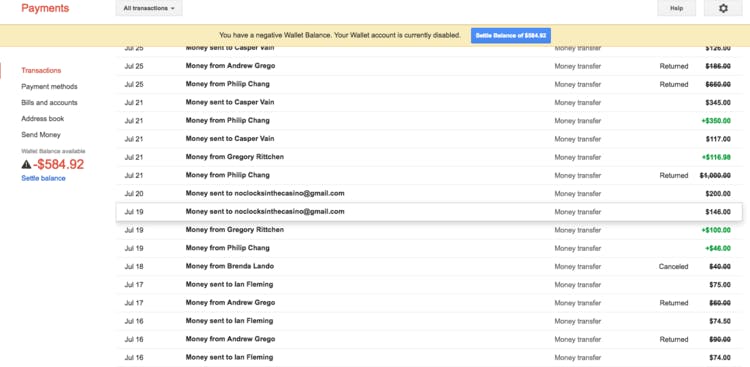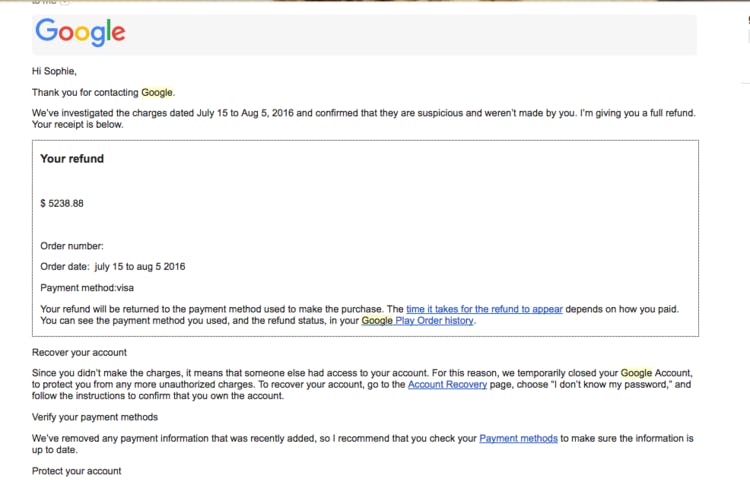For the past month, Sophie Lucido Johnson has done everything she can to disentangle herself from Google. It hasn’t been easy. With files stored on Google Drive, school e-mails that force her to use Gmail, and Google search engines popping up unprompted, Google is deeply woven into Johnson’s daily life. But when the company failed to help her recover thousands of dollars in allegedly fraudulent transactions, Johnson felt she had no choice. She had to de-Google her life.
“Everything I can possibly disconnect from Google, I am doing,” Johnson, a grad student and illustrator, told the Daily Dot. “I feel so helpless. And they don’t care. They won’t care. But it’s a small act of defiance. It’s something that I can do.”
Johnson detailed the harrowing nightmare that prompted her to disconnect from Google on her blog. It started in August, when Johnson was reviewing her checking account and noticed strange transactions coming from Google Wallet. She says she never used the service, except to make a monthly payment for extra cloud storage. When she logged in, she was shocked to find pages of transactions between herself and strangers, many of them for hundreds of dollars.
Johnson contacted Google and her initial experience went well. A customer service representative named Manuel assured her that the transactions would be refunded, and she received the following email:
But weeks passed and no refund appeared in Johnson’s account. Furthermore, Johnson took a closer look at the transactions and noticed that while she is based in Chicago, her account had been accessed from Atlanta and Istanbul. She wondered why—if her account was being accessed from three distant locations within a matter of days—hadn’t Google alerted her to any of this?
Johnson spoke to more customer service representatives, she wrote a lengthy email, and finally, at the urging of a customer service representative, she logged 20 individual, time-consuming complaints on Google Play.
So I sit at my computer for two full hours filing 20 separate dispute forms. There are intervals where I am so angry I am SCREAMING at the computer. Partially this is because, as I am filing an inordinate amount of dispute forms, Google has decided I am a robot, and is forcing me to complete multiple needlessly complex CAPTCHA quizzes. They’re the kind where you have to click on all the pictures with street signs in them. Each one takes about three minutes, and requires ample mental energy.
Then, the unthinkable happened. Johnson spoke to a representative named Frances, who told her plainly, “No fraud has been detected in your account, and so you’ll just have to tell the local authorities.”
Johnson was astonished. She was left with a disabled Google Drive and over $500 of debt.
Suffice it to say, the experience has changed Johnson’s relationship to digital payments. She told the Daily Dot, “Everything is on annoyingly high-security in my world now. I’ve disconnected my Apple Pay and PayPal, and I’ve turned into one of those crazy grandmothers who doesn’t use the internet to buy things. It sucks because I love using the internet to buy things.”
Who doesn’t? Buying stuff online is fast, easy, and, well, fun. As more companies enter the arena of digital payment, competition is growing to attract new users. This means online transactions have become smoother than ever. With a simple click you can enable PayPal Express. Tap your thumbs to your phone and you can send your friends cash for those happy hour drinks on Venmo. Or wave your iPhone 7 at the register and you’ve ApplePay-ed your way to a quicker checkout.
But, as Johnson has learned, the ease of transactions doesn’t always ensure safety. Attempts at fraud aren’t new and they certainly aren’t going anywhere. So, the question becomes, what can these companies do to protect their users?
As perhaps the biggest tech behemoth hoping to win new customers, Google seems like a place that would have much to say about safety. But when the Daily Dot reached out to Google Wallet’s customer service team to discuss Johnson’s story, no one could direct us to someone who could openly discuss fraud protection. We were told the company could not discuss the case because Google does not share information regarding individual accounts. We assured Google that was fine, we simply wanted to understand how its fraud protection worked in general, so they sent us an email with a link to its fraud protection policies.
We also contacted Google’s press email, but no one responded.
The fraud policies sound great, but none of the fine print explains how a promise of reimbursement for fraudulent charges could come to be reversed. Johnson herself speculates that she may have gotten herself into trouble by being too honest.
“The refund was for more money than I was supposed to receive, so I responded back and said that. Maybe that got me in trouble,” said Johnson. “I just want my $2,000 back.”
In a weird turn of events, though, technology—and the real faces that use it—helped to flip this whole nightmare around.
When Johnson tweeted her blog post, several readers shared the account and urged Google to take action.
https://twitter.com/sophielucidojo/status/773527508285263872
@google @googlewallet what the fuck?? This is terrifying: https://t.co/mtW4lJnshd
— Marcia Belsky (@MarciaBelsky) September 7, 2016
https://twitter.com/hopson/status/773572727818956800
https://twitter.com/amanaplanpanama/status/773601992283348994
@googlewallet You see this article? Help a girl out, come on!! https://t.co/FBFoJeSGAL
— Christina B (@multitudeofgeek) September 7, 2016
“The internet lets you write a rant on your blog and have everybody reach out to you and say, ‘Hey, I’m really sorry this is happening to you,'” she said. “I can’t overstate how grateful I am for the reaching out. Google is just a big corporation, but then when you’re talking to individuals, you’re reminded that people are basically good… Having human connections with people, and being able to access that at such a large scale, would have been unheard of in my mom’s age.”
In the end, it seems everyone’s loud rallying paid off. A few days ago, Johnson posted an update on her original blog post: Google erased her debt and made everything right.
Thanks to the loud, angry voices of the internet, Google’s interest in my case was suddenly piqued (someone at The Daily Dot reached out for me, so thanks to my friends who work there), and Rosie (I talked to Rosie four whole times in a row!) fixed my account, alleviated my debt, and gave me 100GB of Google Drive storage for life. So it just goes to show you: If you have the extremely rare privilege of being a person with powerful connections, you too can have your customer service nightmares resolved. I feel guilty and wish that the world was this kind to everyone, and not just those of us who have relatively well-read blogs. But thank you thank you THANK YOU all the same. I can’t believe how lucky I am to have such incredible, supportive friends—far and wide.
Google, however, has yet to respond to Daily Dot’s request for comment.


